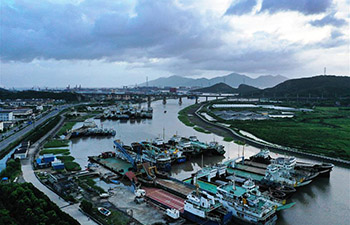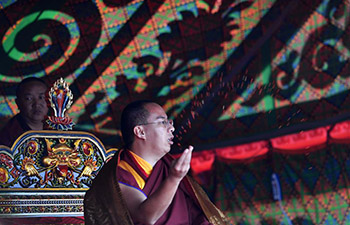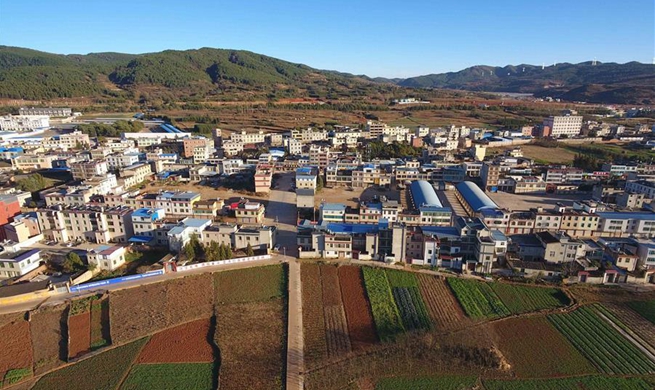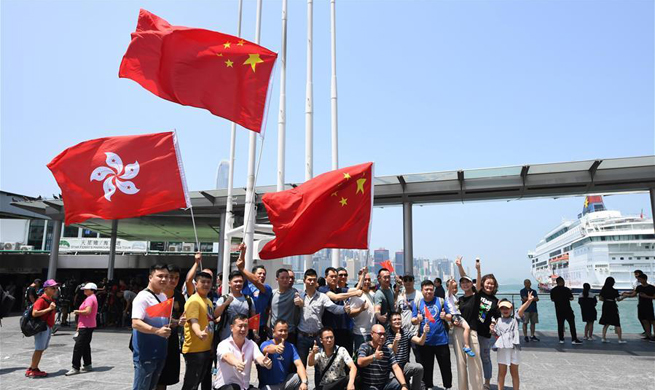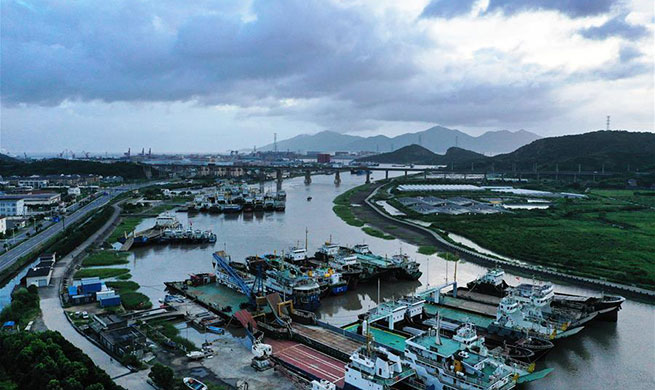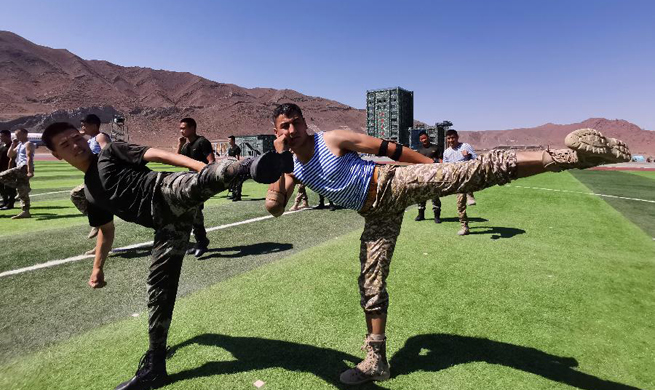SEOUL, Aug. 9 (Xinhua) -- Japan's export curbs on South Korea negatively affected the trilateral security cooperation among South Korea, the United States and Japan, South Korean Defense Minister Jeong Kyeong-doo said Friday.
Jeong made the remark during his meeting with U.S. Secretary of Defense Mark Esper, who arrived here on Thursday for a two-day visit on the final leg of his five-country trip to the Asia-Pacific region since he took office last month, according to Newsis news agency.
"Japan is causing an adverse effect on relations between (South) Korea and Japan and security cooperation between (South) Korea, the United States and Japan by raising security issues and announcing economic retaliatory measures such as export curbs and the removal from its whitelist," Jeong was quoted as saying.
Japan removed South Korea last week from its whitelist of trusted trading partners, after tightening regulations last month on its export to South Korea of three materials vital to produce memory chips and display panels.
Following Japan's announcement of the whitelist removal, South Korea's presidential Blue House said it would review whether to continue exchanging sensitive military intelligence with Japan, referring to the General Security of Military Information Agreement (GSOMIA).
The GSOMIA was signed in November 2016 by South Korea and Japan to share military intelligence on nuclear and missile programs of the Democratic People's Republic of Korea (DPRK).
Many South Koreans saw the deal with Japan as unacceptable because the Japanese leadership had yet to sincerely apologize for its militaristic history. The Korean Peninsula was colonized by Imperial Japan between 1910 and 1945.
The GSOMIA had been automatically renewed each year in August. If either party wants to scrap the pact, the party is required to notify the other of its intention 90 days in advance. This year's notification deadline falls on Aug. 24.
The South Korean defense chief said the Democratic People's Republic of Korea (DPRK) fired off several short-range projectiles in recent weeks amid the continued efforts for the denuclearization and the peace settlement on the Korean Peninsula.
Jeong noted that despite the grave security situations, the Korean Peninsula peace process would be made possible based on the strong South Korea-U.S. alliance.
Pyongyang test-launched short-range projectiles in recent weeks in protest against the South Korea-U.S. joint annual military exercises, which kicked off on Monday, and Seoul's adoption of U.S.-made stealth fighter jets.
The combined forces of South Korea and the United States were scheduled to start the initial operational capability (IOC) verification from Sunday to verify the South Korean military's capability for the transfer of wartime operational control of the South Korean troops from Washington to Seoul.
South Korea's wartime operational command was handed over to the U.S.-led UN Command after the three-year Korean War broke out in 1950. Seoul regained its peacetime command in 1994.
Meanwhile, the Pentagon chief was quoted by Yonhap news agency as saying the United States "is willing to engage diplomatically with North Korea (DPRK) to make progress on all commitments" made in the Singapore summit held last June between top DPRK leader Kim Jong Un and U.S. President Donald Trump.
Esper reaffirmed the "ironclad" South Korea-U.S. alliance, calling it the "linchpin of peace and security" on the Korean Peninsula and in Northeast Asia.
The United States "will remain resolute in the enforcement of the UN Security Council resolutions until the North (DPRK) engages in the complete, verifiable, irreversible denuclearization of the Korean Peninsula," Esper was quoted as saying.
Before the meeting with the South Korean defense chief, Esper met with South Korean Foreign Minister Kang Kyung-wha to discuss major issues between Seoul and Washington.
An unidentified Seoul foreign ministry official was quoted by Yonhap as saying no discussion was made during the Kang-Esper meeting about South Korea's financial contribution to the cost of stationing U.S. forces here.
Washington has pressured on Seoul to contribute more to the upkeep of the 28,500-strong U.S. Forces Korea (USFK), a legacy of the three-year Korean War that ended with armistice, not peace treaty.
Seoul agreed to pay 1.04 trillion won (915 million U.S. dollars) this year, an 8.2 percent hike from the previous year, to share the USFK stationing cost, but South Korea and the United States were expected to begin negotiations soon for next year's cost as this year's agreement is set to expire by the end of this year.
Esper was reportedly slated to pay a courtesy call to South Korean President Moon Jae-in and hold a meeting with Chung Eui-yong, top national security adviser for Moon.
